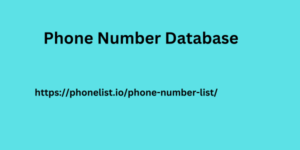Creating a Balanced and Nutritional Diet Plan
Phone Number Library A balanced and nutritious diet is essential for overall health and well-being. It provides your body with the necessary nutrients to function optimally. Here’s a guide to help you create a personalized diet plan that meets your nutritional needs.
Understanding Your Nutritional Needs
Consult a Registered Dietitian: A professional can assess your individual needs and provide personalized recommendations.
Consider Your Age, Gender, and Activity Level: Your nutritional requirements will vary based on these factors.
Identify Any Dietary Restrictions or Allergies: Be aware of any food sensitivities or allergies that may limit your food choices.
Building a Balanced Plate
Fruits and Vegetables
Aim for at least five servings of fruits and vegetables daily. Include a variety of colors to ensure you get a wide range of nutrients.
Whole Grains: Choose whole grains over refined grains, as they provide more fiber and nutrients.
Lean Protein: Opt for lean protein sources such as Phone Number Database poultry, fish, beans, lentils, and tofu.
Healthy Fats: Incorporate healthy fats like avocados, nuts, seeds, and olive oil.
Dairy or Dairy Alternatives: Include low-fat or non-fat dairy products or dairy alternatives like plant-based milk and yogurt.
Portion Control
Use Smaller Plates: This can help you eat smaller portions without feeling deprived.
Measure Your Food: Use measuring cups and spoons to control portion sizes.
Be Mindful of Hidden Calories: Watch out for added sugars, unhealthy fats, and excessive sodium in processed foods.
Hydration
Drink Plenty of Water: Aim for at least eight glasses of water per day.
Limit Sugary Drinks: Avoid sugary beverages like soda, juice, and sports drinks.
Meal Planning and Preparation
Plan Your Meals: Create a weekly meal plan to ensure you have healthy options readily available.
Prepare Meals in Advance: Cook meals in batches or prepare ingredients ahead of time to save time and avoid unhealthy takeout options.
Listen to Your Body
Pay Attention to Hunger and Fullness Cues: Eat when you’re hungry and stop when you’re full.
Avoid Emotional Eating: Use healthy coping mechanisms to manage stress and emotions instead of turning to food.
Make Gradual Changes
Don’t Overdo It: Start with small, achievable changes to Axiata users can check your diet and gradually incorporate healthier habits.Be Patient: It takes time to develop healthier eating habits. Don’t get discouraged if you slip up occasionally.
Additional Tips
Read Food Labels: Pay attention to ingredients, serving sizes, and nutritional information.
Avoid Processed Foods: Opt for whole, unprocessed foods whenever possible.
Consider Supplements: If you have specific nutritional deficiencies, consult a healthcare professional about supplements.
Enjoy Your Food: Eating should be a pleasurable experience. Don’t deprive yourself of the foods you enjoy in moderation.
Remember, a balanced and nutritious diet is a journey, not a destination. By making gradual changes and listening to your body, you can achieve your health goals and improve your overall well-being.

